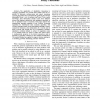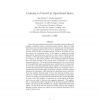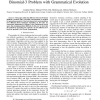1529 search results - page 17 / 306 » Search Space Analysis of the Linear Ordering Problem |
FUZZIEEE
2007
IEEE
14 years 1 months ago
2007
IEEE
— The application of Qualitative Reasoning to Learning Algorithms can provide these models with the capability of automate common-sense and expert reasoning. Learning algorithms ...
ISCAS
2007
IEEE
14 years 1 months ago
2007
IEEE
— Searching for an efficient summarization of multi-channel electroencephalogram (EEG) behavior is a challenging signal analysis problem. Recently, parallel factor analysis (PAR...
IJRR
2008
13 years 7 months ago
2008
One of the most general frameworks for phrasing control problems for complex, redundant robots is operational space control. However, while this framework is of essential importan...
CEC
2009
IEEE
13 years 5 months ago
2009
IEEE
This paper studies the difference between Persistent Random Constants (PRC) and Digit Concatenation as methods for generating constants. It has been shown that certain problems hav...
UAI
2008
13 years 9 months ago
2008
This paper develops a measure for bounding the performance of AND/OR search algorithms for solving a variety of queries over graphical models. We show how drawing a connection to ...



